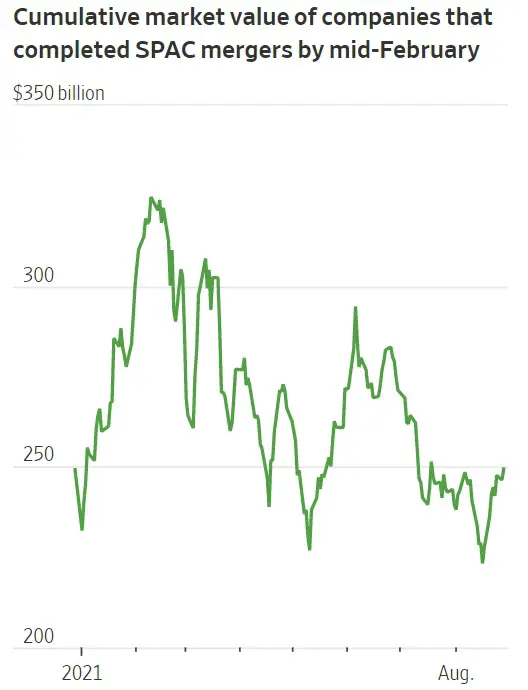Towards the end of financial bubbles, two things generally happen. First, legitimate ways to put capital to work become scarce as prices outrun expected cash flows. Second, large numbers of traders, who have grown used to seeing everything they buy go up, start chasing “innovations” with exciting stories but (in retrospect) insanely high risks.
One recurring variation on this theme is the “dark pool” or “blank check fund,” which is someone with a well-known name saying “Hey, give me your money and I promise to do something cool with it.”
Today this con is known as a SPAC, for “special purpose acquisition company,” and generally takes the form of a publicly traded shell company that raises money with the intent of buying another company, in effect taking the acquisition target public. In other words, it’s a quicker, simpler version of an IPO, which appeals to the instant wealth mindset that dominates late-bubble markets.
SPACs emerged, boomed, and – inevitably because they don’t add any real value – are now tanking. From last week’s Wall Street Journal:
SPAC Rout Erases $75 Billion in Startup Value
The blank-check boom has turned into a rout.
More than six months after the SPAC craze crested, a broad selloff has wiped about $75 billion off the value of companies that came public through special-purpose acquisition companies, according to a Dow Jones Market Data analysis of figures from SPAC Research.
A group of 137 SPACs that closed mergers by mid-February have lost 25% of their combined value. At one point last month, the pullback topped $100 billion. The analysis doesn’t include companies that hadn’t closed mergers as of mid-February or those that are no longer trading.
Over the same span, an exchange-traded fund that tracks companies that recently went public through initial public offerings slid 12%. The Dow Jones Industrial Average gained 13%.
SPAC declines are concentrated in companies tied to green energy and sustainability, though the damage is widespread. About 75% of the SPACs that have announced deals but haven’t completed them are trading below their listing price. Earlier this year, when the sector was perhaps the hottest area of finance, SPACs nearly always rose after announcing deals. Now, it is common for SPACs—such as the one that said in June it is taking electric flying-taxi firm Vertical Aerospace Group Ltd. public—to unveil mergers and see their shares fall.
Even so, the eye-popping returns of early this year have boomeranged on many late arrivers, highlighting the ever-present risks of piling into the latest sure thing. Some investors have watched paper fortunes dwindle in the past few months.
In today’s wildly overvalued world, SPACs aren’t the only sector with the feel of a well-worn scam. One could make the case that the majority of asset classes now have blank-check-fund traits, in the sense that it’s unclear how they’ll ever generate enough cash to justify their current price. But one new asset stands out even in this crowd: Non-fungible tokens, or NFTs, are generating the same kind of frenzy as SPACs did a year ago.
Generally speaking, an NFT is created when someone registers an image or other “virtual asset” on a blockchain, thus proving ownership of the digital file. If that sounds a bit tenuous (not to mention pointless), well, yeah. But the hot money sloshing around out there really wants to believe that owning such a configuration of bits confers value rivaling that of the actual physical asset.
Some recent headlines:
Launchpool Labs Debuts Football-Based NFT Card Game ‘NiftyFootball’
Fake Banksy NFT sells for $340K — then returned for full refund
NFT market will see “massive increase” in volume in 12 months: Devere CEO
RM50,000 for a Pudgy Penguin? Welcome to the NFT revolution
Now, when critiquing NFTs it’s important to distinguish them from “smart contracts,” which might be a way of using a blockchain to streamline and strengthen financial transactions. Criticism of the former doesn’t imply anything about the latter.
But since the standard bubble script calls for an imminent crash that sends hot money pouring out of “peak crazy” assets, it’s reasonable to look forward to a nice bit of Schadenfreude when the SPACs and NFTs of the world have their dot-com catharsis.
——————————–
SPECIAL REPORT
Americans Are Using This Secret IRS Loophole
To Protect And Secure Their Retirement Accounts
Discover It Here



9 thoughts on "SPACs Tank. Are NFTs Next?"